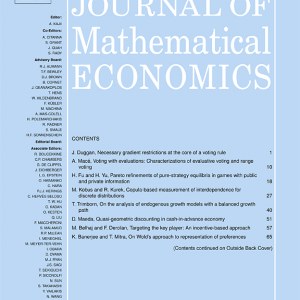
Pfeil, S., Klimenko, N. and Rochet, J. (2017). A simple macroeconomic model with extreme financial frictions Journal of Mathematical Economics, 86:92--102.
-
Affiliated author
-
Publication year2017
-
JournalJournal of Mathematical Economics
We develop a simple macroeconomic model with extreme financial frictions (no credit markets) and show that poverty traps can emerge even in the absence of leverage. In our model, farmers produce fruit by renting land from landlords. Crops are exposed to aggregate shocks (weather risk). To guarantee themselves a positive consumption level even after a bad crop, farmers store fruit as precautionary savings and adjust their scale of activity to the level of these savings. The land that is not rented to farmers is cultivated by landlords, who are less productive. We show that there is a unique Markov competitive equilibrium, in which the rental price of land increases with the level of farmers{\textquoteright} savings. A decline in savings, caused by a bad crop, may bring the economy into a ”poverty trap”, even in the absence of any leverage. Fluctuations of output are caused by productivity shocks and amplified by fluctuations in the level of activity of farmers. The simplicity of our model allows us to study analytically why the long run behavior of the economy may differ markedly from the one predicted by the steady state paradigm. Specifically, we show that when the risk-adjusted productivity of farmers is high and the elasticity of the land supply is low, using the steady state paradigm leads to serious mis-estimations of the long run average state of the economy.